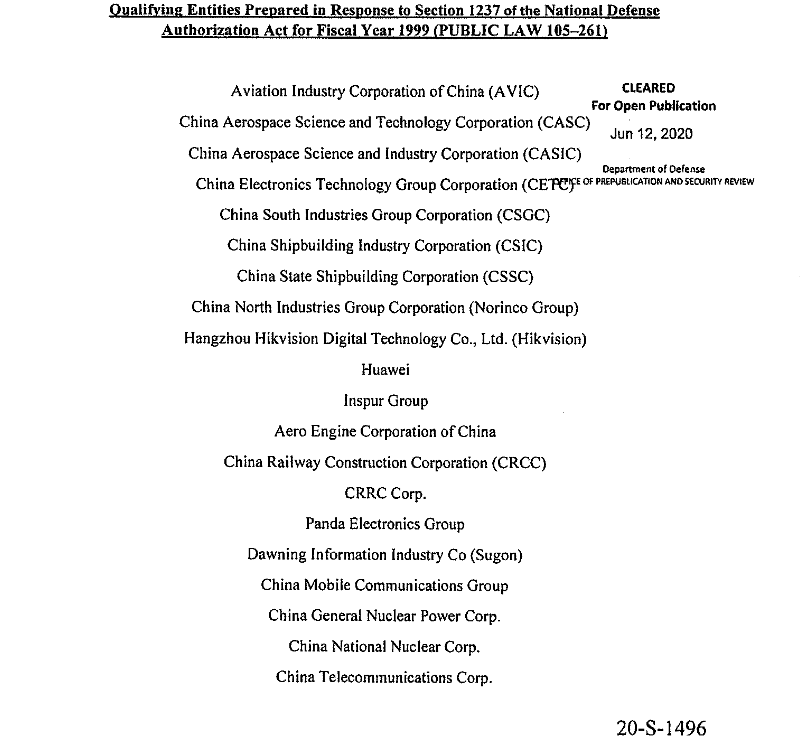The Pentagon has compiled a list of Chinese companies with ties to the country’s military as part of an intensifying effort by the Trump administration and Congress to make it harder for Beijing to secure US investment and sensitive technologies.
The list, which was obtained by the Financial Times, includes several state-owned entities involved everything from nuclear power to aviation. China Telecom and China Mobile, two telecoms companies that are listed in New York, are also named.
Congress required the Pentagon to produce the list in 1999 but officials never followed through on the request. The FT reported last year that the effort gained momentum as lawmakers responded to rising tension with Beijing by telling the Pentagon to name companies it believes help China’s military.
The 1999 law, which specifies Chinese companies that operate “directly or indirectly” in the US, gives the president authorisation to impose sanctions.
A senior official said China’s acquisition of sensitive technology and intellectual property was “a threat” to US economic and national security.
“This list sheds light on Chinese military companies operating in the US to inform the named congressional committees and . . . the executive branch, in light of the role such companies may play in transferring sensitive technology to the Chinese military,” the official said.
Congress is not required to act on the list. But China hawks say it will pressure investors to divest from companies that Washington says threaten national security just weeks after President Donald Trump told the main US government pension fund not to invest in any Chinese-listed companies.
The 20 named companies include Huawei, the Chinese telecoms equipment maker the US believes helps Beijing conduct cyber espionage. It also names Hikvision, which supplies surveillance technology to detention camps in the Xinjiang region where the Chinese government has interned more than 1m ethnic Muslim Uighurs.
Mike Pompeo, US secretary of state, this month said Xi Jinping, the Chinese president, had “greenlighted a brutal campaign of repression against Chinese Muslims”. But John Bolton, the former national security adviser, has said Mr Trump told Mr Xi he did not object to the internments.
Roger Robinson, a former National Security Council official who advocates for a tougher stance on China, said the list would add to the scrutiny of Chinese companies in US capital markets with military ties.
“The complete disconnect between the US security community and Wall Street fund managers and index providers will probably prove unsustainable, especially for the Wall Street folks,” said Mr Robinson, who heads RWR Advisory Group, a consultancy.
Eric Sayers, an Asia security expert and adjunct fellow at the Center for a New American Security think-tank, said the list would add to the pressure to respond to China’s “military-civil fusion strategy”. This policy requires Chinese companies that develop certain technologies to share them with the country’s military.
The US official added that as China “attempts to blur the lines between civil and military sectors, ‘knowing your customer’ is critical”. He added that the list would help the government, private sector and academia to conduct due diligence, particularly as the Pentagon adds more names.
Marco Rubio, a Florida Republican senator who has been a leading voice for taking a tougher stance on China, said the list was a start but was “woefully inadequate”.
“The list only touches the surface of the Chinese government’s exploitation of US capital markets at the expense of retail investors and pensioners by omitting the networks of affiliated and subsidiary companies,” he said.
Mr Rubio added that it was important that US investors were told which Chinese companies were involved in spying, human rights abuses and the broader military-civil fusion strategy.
The Pentagon action comes as relations between the US and China continue to worsen over a range of economic, security and global health issues.
Mr Trump has blasted China over Covid-19 and blamed Beijing for its global spread. Last month he threatened to “cut off the whole relationship” with Beijing.
The list includes Aviation Industry Corporation of China, or Avic, China Shipbuilding Industry Corporation and China Railway Construction Corporation. It also names Norinco, a defence company, and Inspur, a big data and cloud computing group.

